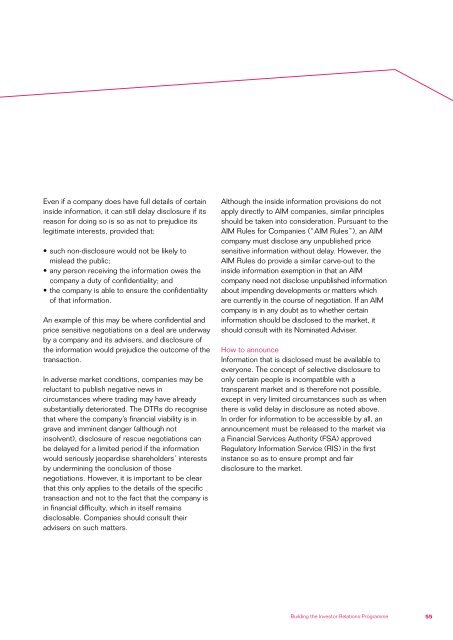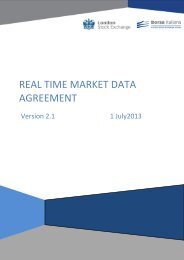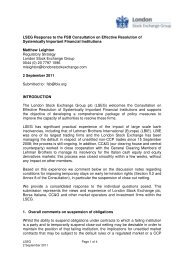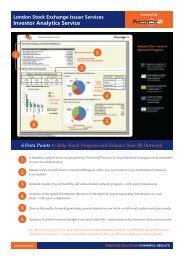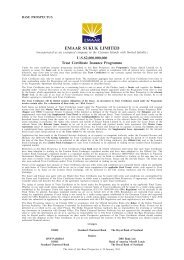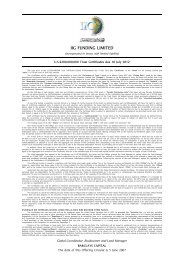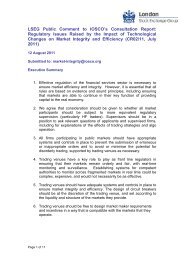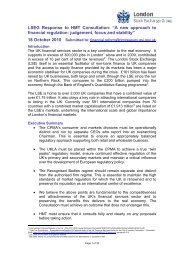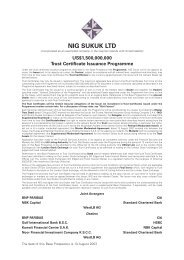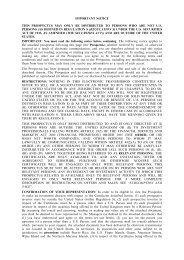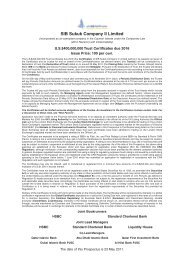Investor Relations - A Practical Guide - Investis
Investor Relations - A Practical Guide - Investis
Investor Relations - A Practical Guide - Investis
Create successful ePaper yourself
Turn your PDF publications into a flip-book with our unique Google optimized e-Paper software.
Even if a company does have full details of certain<br />
inside information, it can still delay disclosure if its<br />
reason for doing so is so as not to prejudice its<br />
legitimate interests, provided that:<br />
• such non-disclosure would not be likely to<br />
mislead the public;<br />
• any person receiving the information owes the<br />
company a duty of confidentiality; and<br />
• the company is able to ensure the confidentiality<br />
of that information.<br />
An example of this may be where confidential and<br />
price sensitive negotiations on a deal are underway<br />
by a company and its advisers, and disclosure of<br />
the information would prejudice the outcome of the<br />
transaction.<br />
In adverse market conditions, companies may be<br />
reluctant to publish negative news in<br />
circumstances where trading may have already<br />
substantially deteriorated. The DTRs do recognise<br />
that where the company’s financial viability is in<br />
grave and imminent danger (although not<br />
insolvent), disclosure of rescue negotiations can<br />
be delayed for a limited period if the information<br />
would seriously jeopardise shareholders’ interests<br />
by undermining the conclusion of those<br />
negotiations. However, it is important to be clear<br />
that this only applies to the details of the specific<br />
transaction and not to the fact that the company is<br />
in financial difficulty, which in itself remains<br />
disclosable. Companies should consult their<br />
advisers on such matters.<br />
Although the inside information provisions do not<br />
apply directly to AIM companies, similar principles<br />
should be taken into consideration. Pursuant to the<br />
AIM Rules for Companies (“AIM Rules”), an AIM<br />
company must disclose any unpublished price<br />
sensitive information without delay. However, the<br />
AIM Rules do provide a similar carve-out to the<br />
inside information exemption in that an AIM<br />
company need not disclose unpublished information<br />
about impending developments or matters which<br />
are currently in the course of negotiation. If an AIM<br />
company is in any doubt as to whether certain<br />
information should be disclosed to the market, it<br />
should consult with its Nominated Adviser.<br />
How to announce<br />
Information that is disclosed must be available to<br />
everyone. The concept of selective disclosure to<br />
only certain people is incompatible with a<br />
transparent market and is therefore not possible,<br />
except in very limited circumstances such as when<br />
there is valid delay in disclosure as noted above.<br />
In order for information to be accessible by all, an<br />
announcement must be released to the market via<br />
a Financial Services Authority (FSA) approved<br />
Regulatory Information Service (RIS) in the first<br />
instance so as to ensure prompt and fair<br />
disclosure to the market.<br />
Building the <strong>Investor</strong> <strong>Relations</strong> Programme 55


